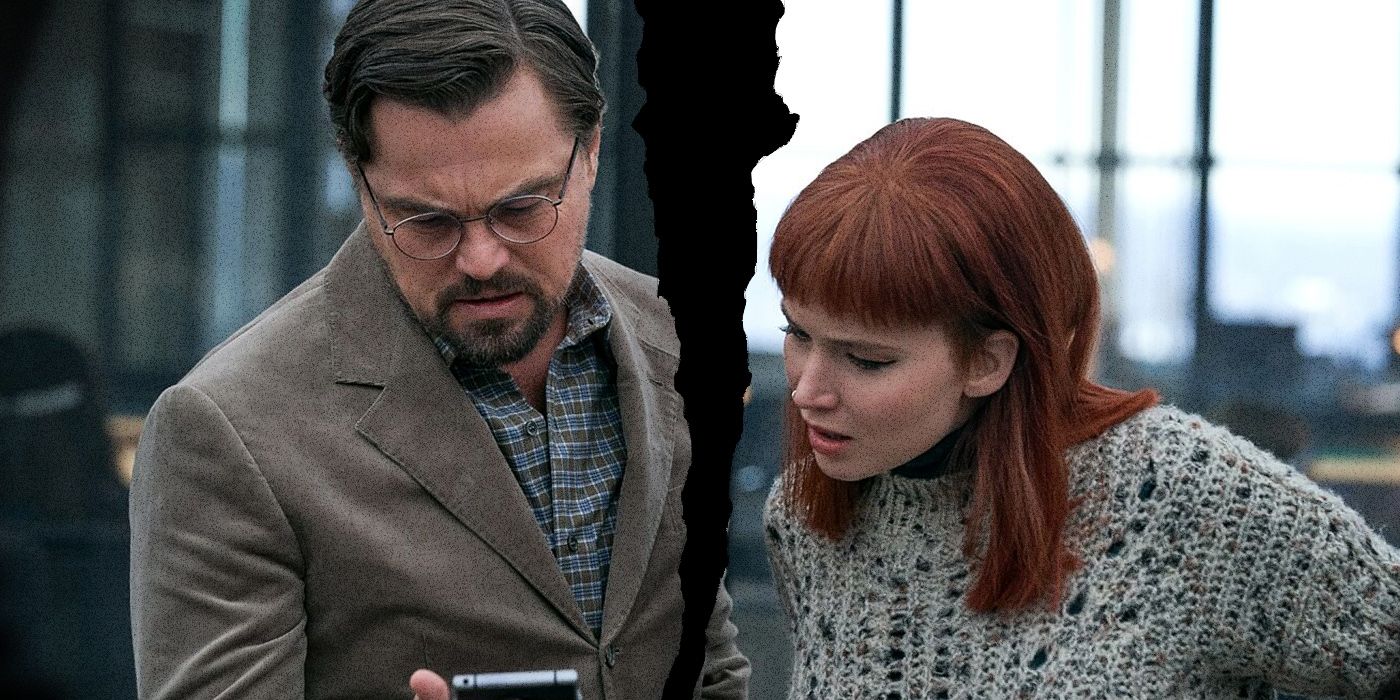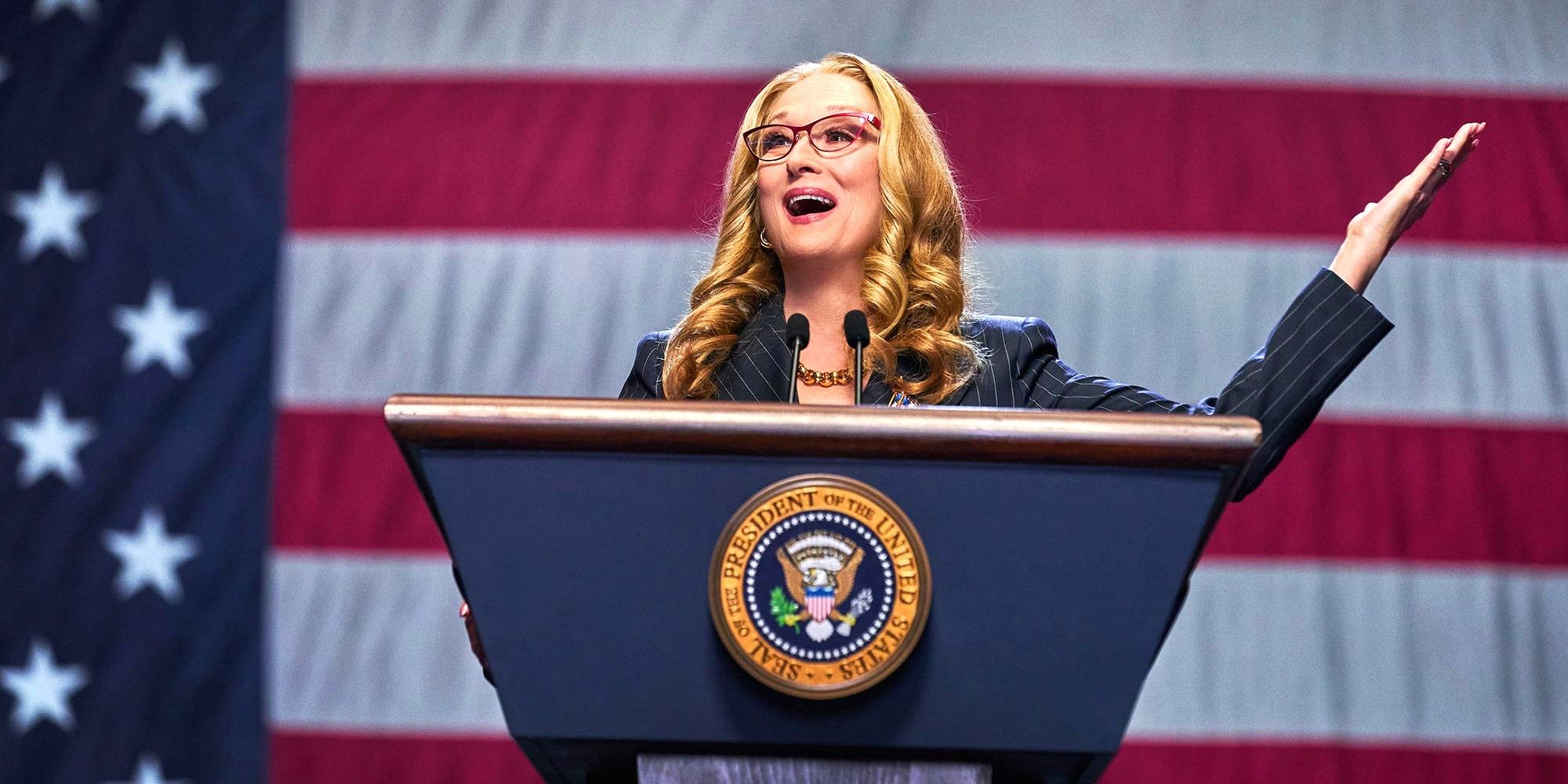Warning: This post contains spoilers for Don’t Look Up.
The movie Don't Look Up has aggressively divided audiences and critics — but why? The satire was written and directed by Adam McKay, who has previously helmed an impressive list of unconventional comedic movies, including The Big Short, Vice, Step Brothers, and Anchorman. Further, Don't Look Up features performances by a stunning array of celebrities: Leonardo DiCaprio, Jennifer Lawrence, Meryl Streep, Jonah Hill, Cate Blanchett, Mark Rylance, Ariana Grande, and Kid Cudi, among others. So why is the 2021 movie quickly shaping up to be 2021's most divisive feature film?
Don't Look Up follows grad student Kate Dibiasky (Lawrence) and her professor Dr. Randall Mindy (DiCaprio) as they discover that a mountain-sized comet is careening toward Earth, with apocalyptic consequences. They struggle to be heard by the President (Streep) and her bumbling son (Hill), and really only find any support with the representative from the Planetary Defense Coordination Office (a real-life government agency). As the government and media refuse to take the immediate existential threat seriously, Dibiasky and Mindy find themselves desperate to be heard. In the end, the President values the advice and profits of the narcissistic and super-rich tech CEO Peter Isherwood (Rylance) above everything else, leading to the total destruction of the planet.
Don't Look Up has proven to be absolutely divisive among critics and audiences alike, largely as a result of the heavy-handed satire. McKay conceived the script as an extended metaphor for the consistently obtuse response to the climate crisis, though it is difficult to ignore prescient parallels to the handling of the COVID-19 pandemic as well. The mixed critical response for Don't Look Up (a 55% on Rotten Tomatoes at the time of writing) seems to have been negatively impacted by a sense that the satirical premise is just too on-the-nose, eliciting eye-rolls with its caricatured criticisms of society's lowest-hanging fruit. The film's nearly two-and-a-half-hour runtime is often brought up in the negative reviews as well, highlighting that about half the critics found the satire to be bloated by its own self-importance.
However, the other side of the debate surrounding Don't Look Up argues that a lighter touch would have made for a less effective movie. When considering the incompetence and greed which have been an underlying thread in the government and media's responses to climate change (not to mention the still-raging pandemic), some critics argue that McKay hits audiences over the head with the comet metaphor because it is necessary at this moment in history. Critics agree that Don't Look Up's cultural and political commentary is ambitious and timely, but they seem to be split down the middle about whether or not the film addresses its targets with the right amount of subtlety.
Since the film was released on Netflix on Christmas Eve, the debate about Don't Look Up's effectiveness has spread to social media. While there seems to be quite a bit of online disagreement among viewers, the movie's 77% audience score on Rotten Tomatoes seems to indicate that the general public has a more overwhelmingly positive take than the critics. Indeed, Don't Look Up has been the most-streamed film on Netflix since its release, with viewers logging 111 million hours of watching it just in its first weekend. The mixed reviews and disagreements about Don't Look Up seem to be pushing even more people to watch and engage with it, which seems like a win for Adam McKay and company regardless of the critical consensus.
Although Don't Look Up still seems to be in the conversation to be recognized at the Oscars, it is clear that the film has divided critics and audiences alike. The fact that the film addresses the climate crisis head-on is certainly a major factor in the polarized response, given that so many people have strong closely-held personal beliefs about the oft-politicized issue. Looking at the extreme spread of responses to Don't Look Up, it is clear that Adam McKay has succeeded in crafting a comedy film that is engaging audiences in thinking critically about its message.


